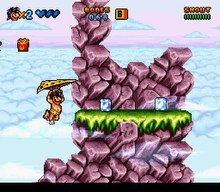Prehistorik Man
| Prehistorik Man | |
|---|---|
 North American box art for the SNES | |
| Developer(s) | Titus France |
| Publisher(s) | Kemco, Titus France |
| Director(s) | Rob Stevens |
| Producer(s) | Eric Caen, Florent Moreau |
| Designer(s) | Francis Fournier, Florent Moreau, Rob Stevens, Eric Zmiro |
| Programmer(s) | Rob Stevens |
| Composer(s) | Laurent Mignard, Gilles Rea |
| Platform(s) | Super NES, Game Boy Advance, Nintendo DSi (DSiware) |
| Release | SNES: Game Boy Advance
|
| Genre(s) | 2D Platform game |
Prehistorik Man is a platforming video game for the Super Nintendo Entertainment System developed by Titus Interactive and published by Kemco in Japan in 1995 as P-Man and by Titus France elsewhere in 1996.[1] It is a sequel to Prehistorik 2, featuring similar graphics but a richer and different story, and additional non-player characters which, among other things, provide hints and a tutorial.
The game was later released for the Game Boy Advance and the Nintendo DSi (as a DSiWare release), with the latter being released in North America on February 15, 2010.
The Super NES version received positive reviews from critics with the story, sound and gameplay being praised. The Game Boy Advance and DSiware ports, however, have gotten mixed reviews.
Plot
Prehistorik Man, like its predecessor, takes place in the Stone Age. In the middle of the night, greedy dinosaurs steal all the food from a small village. With winter coming and the village inhabitants facing starvation, the Village Chief summons Sam, a young and agile villager, and tasks him with obtaining food to help the village survive the impending winter.[2]
Gameplay

The player controls Sam by navigating him through a total of 23 unique side-scrolling levels ranging from burning forests to crystal caverns. The main task is for the player to collect all the food in each level while defeating enemies to make them drop their bones, which is used as currency in the game. The player starts out with three hearts. If the player loses them all, they lose a life and must restart the level. Midway through each level, there is a checkpoint (called a Rees-Tartah) so Sam will not have to start at the beginning once touched. Sam has many abilities to help the player through each level including various weapons which can be picked up, running "like a dog" to move faster and the shout, which enables the player to defeat all enemies on screen. Sam's default weapon is a spiked club but he can find other weapons like spears and axes which will replace any weapon used before, however, these weapons have limited ammo. Throughout the game, various items can be found varying from "stone age shields", which make the player temporarily invincible, heart containers to raise the player's permanent health and letters which spell out B-O-N-U-S, which when all are collected, send the player to a bonus area for a chance to collect more bones and food. Shops are also available for the player to spend bones to buy various items like tickets which the player can use to skip levels or "save stones" which the player can use to save their game. At the end of each level, the food is tallied up and the player is given an overall percentage on how well they did. Certain levels have different gameplay gimmicks which the player has to learn in order to proceed. The majority of levels are simple platformers but other levels involve the player finding specific key items, using vehicles like stone wheels and gliders or defeating a boss.
In the DSiware version, the player can control Sam by using the touchpad on the bottom screen and Sam's power can increase by collecting upgrades that can last for a limited time. The bottom screen also has an item section to let players know what items they must collect to proceed through the game.
Reception
The Super NES version of the game received positive reviews. Electronic Gaming Monthly gave the game an 8.8 out of 10 and their "Game of the Month" award. They particularly lauded the game's storyline, humorous sound effects, strong play control, and numerous secrets.[3] Famicom Tsūshin scored the Super Famicom version of Prehistorik Man a 27 out of 40.[4]
The Game Boy Advance and DSiware ports, however, have received mixed reviews. Metacritic game the Game Boy Advance version of the game a 69 out of 100, with one critic saying that while the game is a solid platformer, it is at the same time, rather generic.[5] Frank Provo of GameSpot, however, praised the music and gave the game a 6.1 of 10, concluding by saying that "at best, Prehistorik Man is a weekend diversion from the GBA's more substantial fare."[6] For the DSiware port, Desiree Turner of Nintendo Life gave the game 3 stars of 5, arguing that "Though it looks and sounds great, it suffers from shoddy hit detection, hard-to-read fonts, and moments of slowdown that make precision platforming nigh impossible."[7]
References
- ^ "Prehistorik Man - Release data". GameFAQs. Retrieved 2015-05-15.
- ^ "Prehistorik Man for Super Nintendo - GameFAQs". www.gamefaqs.com. Retrieved 2015-12-25.
- ^ "Review Crew: Prehistorik Man". Electronic Gaming Monthly (70). Ziff Davis: 32. May 1995.
- ^ NEW GAMES CROSS REVIEW: P-マン. Weekly Famicom Tsūshin. No.341. Pg.30. 30 June 1995.
- ^ "Prehistorik Man". Metacritic. Retrieved 2015-12-29.
- ^ "Prehistorik Man Review". GameSpot. Retrieved 2015-12-29.
- ^ "Review: Prehistorik Man (DSiWare)". Nintendo Life. Retrieved 2015-12-29.
